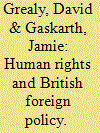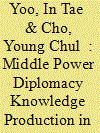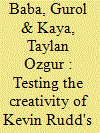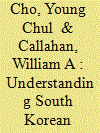|
|
|
Sort Order |
|
|
|
Items / Page
|
|
|
|
|
|
|
| Srl | Item |
| 1 |
ID:
191678


|
|
|
|
|
| Summary/Abstract |
This Special Issue brings the broader history of ‘ethical’ foreign policymaking in the UK into conversation with more contemporary case studies. In doing so, it highlights key issues that have shaped, and will continue to impact, Britain’s ability to play a leading role in the advancement of human rights norms and institutions as a ‘middle power’ within a shifting global order (Cooper and Dal, Citation2016; Efstathopoulos Citation2018; Murray and Brianson Citation2019). For some time, scholarly engagement with the ethics of British foreign policy and human rights promotion was dominated by discussion of New Labour’s foreign policy outlook as articulated in Robin Cook’s ‘mission statement’ for the Foreign and Commonwealth Office (FCO) in May 1997. British foreign affairs, Cook asserted, must have an ‘ethical dimension’ and the Labour government would therefore put human rights ‘at the heart’ of its foreign policy – a line that morphed in the media into ‘ethical foreign policy’ (Guardian, Citation1997). While New Labour has been credited for breaking new ground in terms of British engagement with the international human rights regime, this Special Issue looks to examine periods either side of the Cook era, to gain a wider historical picture of how human rights have been incorporated into British foreign policy (Wheeler and Dunne Citation1998; Gaskarth Citation2006; Gilmore Citation2015).
|
|
|
|
|
|
|
|
|
|
|
|
|
|
|
|
| 2 |
ID:
177888


|
|
|
|
|
| Summary/Abstract |
Over the past four years, while the Trump administration doubled down on its “America First” foreign policy and Sino-American tensions continued to sharpen, another trend has been equally pertinent: the growing relevance of middle power diplomacy. A loose collection of like-minded, mid-sized players who also are traditional US democratic allies—including Europe (i.e., Germany, France, the United Kingdom, and the EU itself), Canada, Japan, and Australia—have reinforced partnerships with one another and increasingly taken it upon themselves to press forward with multilateral solutions to various regional and global challenges in the absence of leadership from Washington. Underpinning their efforts is a shared concern about the unraveling of international order as the United States abdicated its traditional leadership role under President Trump and China’s assertiveness has grown, especially in the wake of the COVID-19 pandemic.
|
|
|
|
|
|
|
|
|
|
|
|
|
|
|
|
| 3 |
ID:
187972


|
|
|
|
|
| Summary/Abstract |
In this article we examine the ways in which middle power diplomacy (MPD) knowledge is produced in the South Korean IR community, specifically in the context of critical IR studies. In doing so, we attempt to address the questions of who produces MPD knowledge, why, for whom, and for what purposes, while also identifying the meta-theoretical underpinnings of MPD knowledge. Our critical review of the literature suggests that current South Korean MPD knowledge is a Korean version of hegemonic stability theory, which aims to secure the US liberal hegemony in world politics. We therefore argue that South Korean MPD knowledge may limit South Korea’s agency in IR as well as its scholarly thinking space for discerning novel ways of peacefully coexisting with others and sensing possible systemic transformations of global politics.
|
|
|
|
|
|
|
|
|
|
|
|
|
|
|
|
| 4 |
ID:
137780


|
|
|
|
|
| Summary/Abstract |
This paper seeks to enrich understandings of middle-power security strategies by examining countries that lack great-power capabilities but still aim to influence the regional security environment. Based on a literature review highlighting the functional and behavioral approaches of middle power diplomacy, we note that these elements could also apply to their regional security strategies. The paper focuses on regional security strategy as a subset of foreign policy and asks why some middle powers appear to go for a regional security strategy that is more functional while others adopt a strategy that is more behavioral. It argues that this divergence derives primarily from differences in resource availability and strategic environment. An analysis of Indonesia, South Korea, Australia and Vietnam highlights how each of these middle powers has adopted a particular regional security strategy, driven by their resource availability and strategic environment.
|
|
|
|
|
|
|
|
|
|
|
|
|
|
|
|
| 5 |
ID:
138095


|
|
|
|
|
| Summary/Abstract |
The 2007 Australian Parliamentary Elections brought a new dynamic to Australia’s foreign policy: the Kevin Rudd factor. The Prime Minister sought to develop a more proactive and multi-faceted foreign policy around ‘Creative Middle Power Diplomacy’. This study aims to cast light on the dynamism in Australia’s Foreign Policy with Kevin Rudd within the framework of middle power activism. The research firstly focuses on the difficulties of defining and classifying middle powers through which it will put forward specific ‘commonalities’ for successful middle power foreign policy outcomes. The study of the EU–Australia Partnership Framework and the Asia-Pacific Community proposals – both of which were priorities for Kevin Rudd – reveal the potential and limits of middle power activism. This study argues that in today’s world, middle powers have growing potential to pursue specific foreign policy goals but their ability to achieve these goals is constrained by Great Powers’ interests and consent, and also by the nature or ‘commonalities’ of middle power diplomatic practice.
|
|
|
|
|
|
|
|
|
|
|
|
|
|
|
|
| 6 |
ID:
189019


|
|
|
|
|
| Summary/Abstract |
This study aims to examine South Korean middle power diplomacy discourses using premodern Korea’s diplomatic thinking-cum-practice of sadae (serving the great) as a heuristic device. It is argued that current discourses of South Korea as a middle power resonate with sadae because they strive to secure the existing liberal international order led by the West and the United States. It also argues that it is both necessary and healthy for South Korean middle power diplomacy studies to denaturalize its self-evident faith in the existing liberal international order—a not universal but particular order among several possible others in history—with South Korea celebrating and appropriating liberal values. This would prepare South Korean middle power diplomacy research to tackle uncertainty, difference, and pluralism in global politics while producing more responsible and responsive scholarship in international relations.
|
|
|
|
|
|
|
|
|
|
|
|
|
|
|
|
|
|
|
|
|